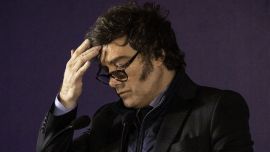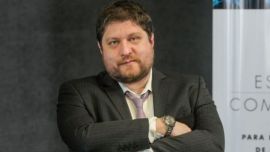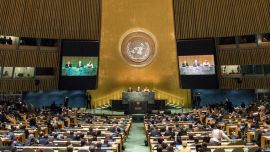Reaching out a weathered hand, Marciana Caycedo prods the smooth round bellies of the mothers-to-be, feeling for their baby's outline inside the taut skin as they line up at her home.
In time, she will deliver those babies, into a world where families are big but food, medicine and even water are in short supply.
For Caycedo is the only midwife on Isla Mono, a small island marooned in the middle of the wide brown San Juan river, on Colombia's remote and rainy Pacific coast.
"The first baby that I brought into the world was the last of my mother's, the youngest of my 23 brothers and sisters," says Caycedo in her simple wooden house, light streaming through the wall's ill-fitting boards.
Now 60, she has been through 17 pregnancies of her own.
She has mice in her house. They trot along its wooden beams as she bends to examine a small 17-year-old who thinks she is eight months pregnant.
Caycedo feels the small mound of her abdomen: "It's a boy," she says.
"You're anaemic," she tells the girl. "Even if you don't like it, you're going to have to eat lentils and carrots."
Which poses a challenge on Isla Mono, where practically nothing edible grows on the sandy soil, apart from coconuts and potato-like taro.
Fruits and vegetables and the like are brought in from Buenaventura, two hours away in a fast skiff with a roaring outboard.
But the cost of fuel to run the engines is exorbitant for most of the 370 islanders, who subsist on fishing and timber, making many basic goods inaccessible.
"I want to stop because it's very hard but... the people tell me I have to continue," said Caycedo, who earns US$28 a birth – even if sometimes it means braving a raging tropical storm in the dead of night.
Salty coffee against bleeding
At her side is Durley Maya Salazar, a 33-year-old obstetrician-gynecologist, who is making an unanticipated visit to the island.
Salazar works with a hospital ship, the San Raffaele, that roams the coast. Fortuitously for locals, it's here only because it ran aground on a sandbank.
Medical specialists aboard decided to see what good they could do for the neglected locals, while the ship waits for a rising tide.
The gynaecologist and the local midwife exchange tips. Caycedo tells her about using strong coffee and salt to stop post-partum bleeding, and local plant extracts to ease mothers' anxieties.
Salazar is relieved to discover Caycedo rejects the folk method of shocking a baby into taking its first breath: by introducing the head of a little chick into the newborn's anus.
The baby is meant to cry out and fill its lungs.
"The midwives here lack gloves, masks, anti-hemorrhagic drugs," said Oscar Arley Gómez, a specialist on the hospital ship, who has designed medical guides adapted for Afro and indigenous cultures.
Surprise medical landing
The medics are neither surprised nor encouraged by what they find. Pathways between the humble dwellings – built on stilts – are paved with tree trunks providing a sort of raised walkway above the thick mud left by a tropical storm.
There are stagnant cesspools, malarial mosquitoes and the ever-present odour of open latrines.
Huge blue plastic drums await the next downpour, providing vital water. Isla Mono has none, and depends on the skies for its drinking water.
"Once, it didn't rain for a month, we had to take water from the river, which is completely polluted. Many people got sick," says Ana Milena Copete, 29, one of five teachers for the island's 113 enrolled children.
Chemical residue from cocaine production in the nearby forests, and run-off from clandestine gold mining, are responsible for much of the pollution, environmentalists say.
"The situation is critical. It is such an isolated place that many people do not even know that Isla Mono exists," says Copete.
Doctors to the rescue
The San Raffaele's doctors – two generalists, a gynecologist, pediatrician and a paediatric surgeon – waste no time in improvising a clinic in the new, concrete-clad school.
An orderly queue of islanders is formed. Some will be seeing a doctor for the first time.
Durley Maya sees a 24-year-old mother with five children, who wants to be "cancelled" – local code for sterilisation by tubal ligation. Others are looking to be fitted with a contraceptive implant.
For that, they need to be taken onto the hospital ship.
She examines Caycedo's young patient, reassuring her: "Your baby is very small, but the heart is beating well," and inviting her back to the ship for a more detailed examination.
A blood test confirms Caycedo's diagnosis of anemia, and an ultrasound that it is indeed a boy. She is 31 weeks pregnant. The mother-to-be returns from the ship with a full supply of vitamins.
Her friend Karol González, who was also examined on board the San Raffaele, is three months pregnant. "I haven't seen a doctor yet because there's no clinic here and it's hard to pay for the fuel" that would allow her to go to Buenaventura.
The 19-year-old will use Caycedo for the birth as there is no alternative. A round trip to Buenaventura's hospital by river costs more than the midwife's services. "I'm scared because it's my first baby and I'm afraid of losing my blood," said Karol.
For now, she is calmed by the wonders of technology, visibly moved to see her baby's tiny movements for the first time on the ultrasound screen.
by by Florence Panoussian, AFP. Reporting from Isla Mono, Colombia.


























Comments